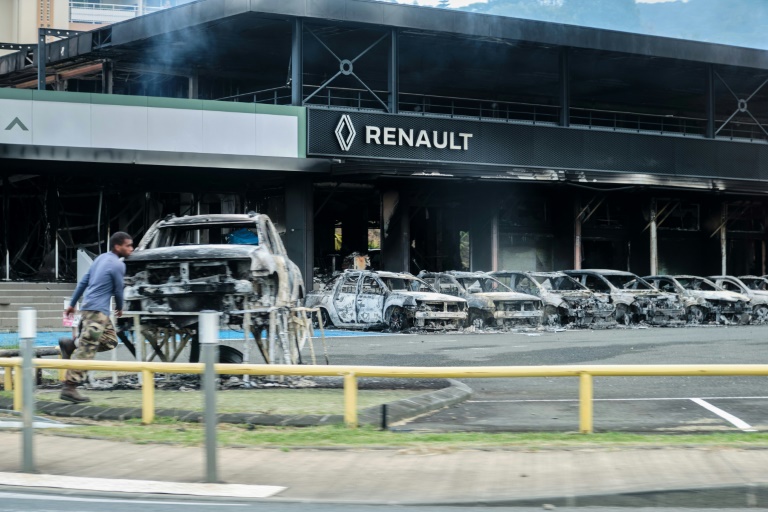LONDON: Nearly 100 soldiers who served in the UK Armed Forces in Iraq may have been exposed to a toxic chemical while posted to guard the Qarmat Ali water treatment plant near Basra in 2003.
Sky News spoke to 10 former servicemen who claimed that exposure to sodium dichromate, a highly carcinogenic substance used to treat water to prevent corrosion of pipes, pumps and other equipment, had left them with severe health issues.
At least 88 UK military personnel are known to have guarded the site, which was built in the 1970s to provide water to clean nearby oil infrastructure.
Soldiers told Sky News that thousands of bags of sodium dichromate, an orange powder, were kept at the site in conditions open to the elements, leading to the wind scattering it across the facility.
Andy Tosh, a former Royal Air Force sergeant, said: “It’s clear British troops were knowingly exposed.”
The site was considered highly important after the US-led invasion of Iraq in order to get the country’s oil industry back to capacity.
US troops would escort contractors from a company called KBR to the site, where they were then protected by British RAF soldiers before returning home.
The RAF provided 24-hour protection for the Qarmat Ali plant after it was damaged by looters, with one soldier likening it to a “scrapyard.”
British and US personnel reported suffering regular nosebleeds, rashes and lesions after spending time at the site.
In August 2003, two men arrived at the site wearing respirators and hazmat suits, who put up a sign with a skull and crossbones reading: “Warning. Chemical hazard. Full protective equipment and chemical respirator required. Sodium dichromate exposure.”
Tosh said: “We were shocked, it was a different type of threat that none of us could really understand.”
Jim Garth, a former RAF corporal, said: “Unbeknownst to us, (sodium dichromate) was all around us all the time.”
A US Department of Defense investigation blamed KBR for delays in identifying potential danger, saying the company first became aware of sodium dichromate use at Qarmat Ali on May 31, 2003.
It added that both KBR and the US military task force responsible for restoring Iraqi oil production reported in June that year that the site was potentially hazardous.
In 2009, the US Senate opened an inquiry into the contamination at Qarmat Ali. In a video deposition, Lt. Col. James Gentry of the Indiana National Guard said KBR “had this information and didn’t share it. I’m dying now because of it.”
He died of cancer later that year, which the US military said was due to “exposure to sodium dichromate” in the “line of duty.”
Russell Powell, a former medic, told the inquiry that he had suffered “severe nosebleeds” when he arrived at the site, and that he and other personnel developed rashes across their hands and arms within three days.
He told the Senate that a KBR employee said his supervisors had reassured him the orange powder was nothing to worry about.
“My symptoms have not changed since my service in Iraq,” Powell told the inquiry. “I cannot take a full breath.”
Epidemiologist Herman Gibb testified to the inquiry in 2009 that exposure to sodium dichromate was consistent with many of the symptoms reported by US personnel.
He told Sky News it was “more likely than not” that sun exposure was the root cause of skin cancer cases reported by troops, but that it was possible skin damage would have been exacerbated by chemical exposure.
A court in Oregon subsequently awarded 12 US servicemen $85 million in total after a case was brought against KBR following the Senate inquiry for “reckless and outrageous indifference” in failing to protect them from exposure to sodium dichromate. An appeal by KBR eventually saw the ruling overturned.
The former UK servicemen told Sky News that they feel “betrayed,” demanding a public enquiry and for the Ministry of Defense to provide support for victims.
Tosh said he developed skin cancer on his nose and right hand. “That’s the hand for holding my weapon, which would have had more dust or toxic chemical potentially on it,” he added.
“I’d hate to think, nowadays, out of the number of people who went there, how many people are ill or maybe have passed away.
“We shouldn’t have been there in the first place. But even when the warning signs went up, why did they make us stay?”
Tim Harrison, who also guarded Qarmat Ali and who now works as a paramedic, said he suffers from poor health which, he believes, stems from his time at the site.
“Last year, I was at work and all of a sudden my nose just started gushing with blood,” he said. “I couldn’t stop it for two to three hours and I had to get admitted to A&E and stay overnight.”
He said the nosebleeds continue to be a daily occurrence, and he has developed skin lesions on his legs.
Craig Warner, another veteran who served at the site, developed a brain tumor which his surgeon said was due to chemical exposure.
Former soldier Eric Page developed testicular cancer that spread to his stomach lymph nodes, and ex-colleague Ben Evans’s nose had to be cauterized after regular nosebleeds became too severe to tolerate.
Three other former Qarmat Ali RAF guards — Tony Watters, Andrew Day and Darren Waters — all report regular rashes and bleeds.
Two soldiers who served with the unit have subsequently died, though a link to chemical exposure has not been established.
The MoD told Sky News: “As soon as we were alerted to the possible exposure of sodium dichromate, an environmental survey was conducted to evaluate typical exposure at Qarmat Ali.
“Results showed that the levels at the time were significantly below UK government guidance levels.
“Anyone who requires medical treatment can receive it through the Defense Medical Services and other appropriate services.
“Veterans who believe they have suffered ill health due to service can apply for no-fault compensation under the War Pensions Scheme.”
KBR told Sky News: “The company was performing work at the direction of the US Army under the extreme and continually evolving conditions of wartime Iraq.
“KBR abided by the war zone chain of command. KBR reasonably, timely and repeatedly notified the US Army of sodium dichromate at the facility upon discovering it, and acted promptly to address it. All of the claims made against KBR were dismissed by US courts.”

Aster healthcare to distribute 150,000 Iftar kits to motorists in collaboration with Dubai Police
Denial of responsibility! Pioneer Newz is an automatic aggregator of the all world’s media. In each content, the hyperlink to the primary source is specified. All trademarks belong to their rightful owners, all materials to their authors. If you are the owner of the content and do not want us to publish your materials, please contact us by email – [email protected]. The content will be deleted within 24 hours.






